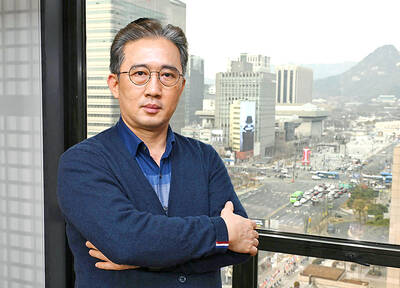Former UN chief weapons inspector Hans Blix, in an interview broadcast yesterday, said British Prime Minister Tony Blair replaced "question marks with exclamation marks" in intelligence dossiers used to justify the decision to invade Iraq in 2003.
Blix, who led the UN search for weapons of mass destruction in Iraq until June 2003, said a later discredited dossier on Iraq's weapons programs had deliberately embellished the case for war.
Blair's government published a dossier before the invasion which claimed former Iraqi president Saddam Hussein had stockpiles of chemical and biological weapons and could deploy some within 45 minutes.
"I do think they exercised spin. They put exclamation marks instead of question marks," Blix said in an interview with Britain's Sky News television broadcast yesterday.
Blix said that Blair and US President George W. Bush had "lost a lot of confidence" once failures in intelligence were exposed, according to interview excerpts released in advance.
Britain's so-called "dodgy dossier" on Iraq's supposed possession of weapons of mass destruction was criticized by Lord Butler's 2004 official inquiry into intelligence on Iraq.
Though Butler did not fault Blair's government, he criticized intelligence officials for relying in part on "seriously flawed" or "unreliable" sources.
No weapons of mass destruction were found after the war, Butler's review concluded, and the dossier, which helped Blair win the support of parliament to join the US in the conflict, had pushed the government's case to the limits of available intelligence.
"I think if they'd allowed us to carry on the inspections a couple of months more then we would have been able to go to all the sites suspected of by intelligence -- British, American or other," Blix said, referring to the period immediately before the 2003 invasion.
He said that intelligence officials would likely have drawn the eventual conclusion that Iraq had no weapons stockpiles and that their sources were providing poor quality information.
Blix said that the US had acted like witch hunters.
"They wanted to see anything as evidence that the Iraqis had weapons of mass destruction," he was quoted as saying.

VAGUE: The criteria of the amnesty remain unclear, but it would cover political violence from 1999 to today, and those convicted of murder or drug trafficking would not qualify Venezuelan Acting President Delcy Rodriguez on Friday announced an amnesty bill that could lead to the release of hundreds of prisoners, including opposition leaders, journalists and human rights activists detained for political reasons. The measure had long been sought by the US-backed opposition. It is the latest concession Rodriguez has made since taking the reins of the country on Jan. 3 after the brazen seizure of then-Venezuelan president Nicolas Maduro. Rodriguez told a gathering of justices, magistrates, ministers, military brass and other government leaders that the ruling party-controlled Venezuelan National Assembly would take up the bill with urgency. Rodriguez also announced the shutdown

Chinese President Xi Jinping’s (習近平) purge of his most senior general is driven by his effort to both secure “total control” of his military and root out corruption, US Ambassador to China David Perdue said told Bloomberg Television yesterday. The probe into Zhang Youxia (張又俠), Xi’s second-in-command, announced over the weekend, is a “major development,” Perdue said, citing the family connections the vice chair of China’s apex military commission has with Xi. Chinese authorities said Zhang was being investigated for suspected serious discipline and law violations, without disclosing further details. “I take him at his word that there’s a corruption effort under

China executed 11 people linked to Myanmar criminal gangs, including “key members” of telecom scam operations, state media reported yesterday, as Beijing toughens its response to the sprawling, transnational industry. Fraud compounds where scammers lure Internet users into fake romantic relationships and cryptocurrency investments have flourished across Southeast Asia, including in Myanmar. Initially largely targeting Chinese speakers, the criminal groups behind the compounds have expanded operations into multiple languages to steal from victims around the world. Those conducting the scams are sometimes willing con artists, and other times trafficked foreign nationals forced to work. In the past few years, Beijing has stepped up cooperation

The dramatic US operation that deposed Venezuelan president Nicolas Maduro this month might have left North Korean leader Kim Jong-un feeling he was also vulnerable to “decapitation,” a former Pyongyang envoy to Havana said. Lee Il-kyu — who served as Pyongyang’s political counselor in Cuba from 2019 until 2023 — said that Washington’s lightning extraction in Caracas was a worst-case scenario for his former boss. “Kim must have felt that a so-called decapitation operation is actually possible,” said Lee, who now works for a state-backed think tank in Seoul. North Korea’s leadership has long accused Washington of seeking to remove it from power